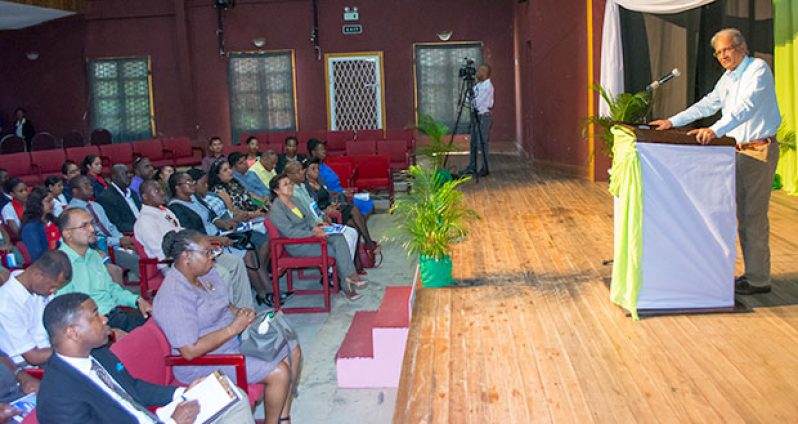By Alva Solomon
THE Caribbean Examination Council (CXC) on Thursday launched its green engineering syllabus and Education Minister, Dr Rupert Roopnaraine has described the move as a step in the right direction.The syllabus, which is one of several being introduced by CXC at the CAPE level, will enable students to acquire the knowledge, skills, values and attitudes needed to sustain the natural environment.

CXC intends to ensure students develop 21st century engineering skills and ethics required for sustainable development.
Speaking to a gathering of educators and students at the Theatre Guild Playhouse in Kingston at the launching of the programme, Dr Roopnaraine told the audience that the creation of a green economy is a national policy.
“Green engineering is therefore an immediate import and application to Guyana,” the minister said, adding that offering a course in green engineering is most timely from the standpoint of developing the manpower required by Guyana for the implementation of its policy of a green economy.
The entire globe is threatened by global warming and low-lying states such as Guyana are more susceptible to rising sea levels.
CXC was established in 1972 under an agreement by participating member states, and its mandate has been to conduct examinations across the Caribbean region.
Guyana being a member of Caricom has mandated the education body conduct appropriate examinations for its citizens.
Dr Roopnaraine said the modules of the green engineering course “seems to encompass” the knowledge -base and skillsets required for the creation and sustainability of “much needed green economy” for the mitigation and reversal of global warming.
According to the Education Minister, Caricom is often castigated for “its slothfulness and failures without any accolade for its successes” but noted that “Once again I believe that CXC has risen to the occasion and continues to be a beacon to be emulated by the outer organs of Caricom,” he said as he made reference to the launch of the new syllabus.
Hinterland Electrification Company Inc Chief Education Officer (CEO) Horace Williams deemed the introduction of the programme an excellent idea.
He said that it is one of the “best ways of promoting green thinking in Guyana and the Caribbean” as he outlined Government’s plans and projects geared at developing the renewable energy sector.
Williams said the project will be beneficial to the country by ensuring that the next and future generations will better manage the environment. He added that additional academic programmes in the field of renewable energy are needed and called for such programmes to be introduced at the University of Guyana.
CXC Subject Panel Member, Dr Paulette Bynoe in giving an overview of the syllabus, noted that it is organised into two units: each unit comprises three modules which require 50 hours of teaching.
In Unit One, termed the Introduction to Green Engineering, there are Module One which addresses concepts and issues, Module Two which addresses theoretical framework of green engineering and Module Three looks at green engineering in practice.
Unit Two, she said, is termed the application of Green Engineering Principles. That unit includes Module One (utilisation of sustainable materials and energy), Module Two (sustainable designs) and Module Three (green engineering solutions).
In terms of assessment, the external assessment will account for 70 per cent of the marks attained while the school-based assessment will account for 30 per cent.
Students are encouraged to work in groups to complete their SBAs.




.png)









